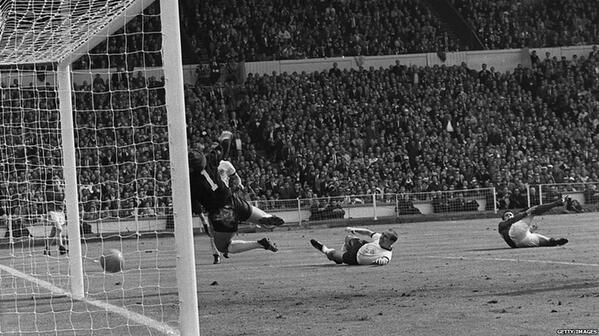
FIFA World Cup Football History
Sports

979 views
0 likes
You will need to sign in before you can comment or like.
The Football World Cup, started back in 1930, is the
most popular sports event. And things that makes it
exceptionally special are the unpredictable
events that are so common.
Some of such unforgettable World Cup moments follow...
Although football was officially born in 1904 with the founding of FIFA, it was not until
1924 and the Olympic tournament in Paris that the international game really came to its
great glory. In 1928 however, when many nations abstained from the Olympic tournament in Amsterdam, the FIFA congress decided to organise a new tournament - the
FIFA World Cup in 1930 in Uruguay without any qualifying rounds.
- The whole of this world cup took place in a single city, Montevideo, with its three stadiums. In the final, Uruguay were down 2-1 at
half time, but fought back bravely to stun
the Argentineans with a 4-2 victory.
Italy won the 2nd and 3rd. I may have let
in four goals, but at least I saved the lives of
11 men
, Hungary goalkeeper referred to
the telegram Mussolini sent to the Italy team
before the 1938 Final, which contained the
words Win or die
. Throughout the second
world war, the Italian Vice-President of FIFA
hid the world cup trophy in a shoe-box under his bed.
1950 saw the first post-war world cup in Brazil. They just needed a draw against Uruguay
in Maracana- the planet's biggest stadium to become World Champions but were defeated. A whole nation was plunged instantly into mourning. The Brazilian officials even
forgot to present the Uruguayans with the trophy. FIFA President Jules Rimet himself
went onto the pitch in search of the Uruguayan captain to perform the ceremony.
The fifth one in Switzerland (1954) was unforgettable for its sensational high-scoring
games, introduction of television coverage and a surprise win for an admittedly understrength German side against Hungary. It was also the first time in history that all players
wore a number on their shirt. Hungary, the magical Magyars
were the favourites with a
team including Puskas, Bozsik, Kocsis and Hidegkuti, unbeaten in 28 internationals (since
May 1950) and Olympic champions. But after the infamous Battle of Berne
with
Brazil, three players were sent off and the teams fought afterwards in the dressing rooms. In the final, after leading 2-0
against West Germany, whom they had
beaten 8-3 in the opening round, they
went down 3-2. In ten memorable
minutes the West Germans had fought
back to equalise. After the Hungarians hit
the post, Helmut Rahn scored the winner
for West Germany with only six minutes
remaining, when the Hungarian goalkeeper slid on the wet grass as he was
about to go for the ball.
Brazil, inspired by a 17-year-old youngster called Pele, won the trophy for the first time in 1958. Pele scored
against Wales, hit a hat-trick in a 5-2 win over France
in the semi-finals and struck two more in the final, a 5-2 triumph over the hosts Sweden. The real magician
was Mario Zagallo, who was there again in the 1962
winning team and then in 1970 as coach, when Brazil
took home the Jules Rimet Cup forever after their
third win. Best goal-scorer Just Fontaine's (France, 13
goals) record stands to this day and is unlikely ever to
be suppressed.
1962 saw another Brazilian triumph. The tournament also staged one of the most notorious matches in the history - the Battle of Santiago between Italy and Chile, in which two
Italians were sent off and one had his nose broken by a solid left-hook from a Chilean
player.
The 1966 world cup was won by host England. After the Jules Rimet Trophy was stolen
while on display in London, the hosts triumphed
again when it was recovered by a dog called
Pickles under a bush in a suburban front garden
in south London a few days later. Defending
champion Brazil was eliminated in the first
round. Probably no event in the history of the World Cup has caused so much discussion as
the so-called Wembley goal', a controversial
one (goal-line controversy) that set England on
the way to victory when Geoff Hurst (hat-trick)
made it 3:2 in the final against Germany. North
Korea became the first Asian country to reach quarter final stage but lost to Portugal in
one of the most astounding and entertaining matches in the history of the competition.
Amazingly trailing 0-3 to North Korea, Portugal staged a rousing comeback courtesy of
four goals from the trailblazing star Eusebio (popular as the Black Pearl) and eventually
triumphing by 5-3.
The Jules Rimet Cup, named after the founder of the FIFA World Cup competition, became Brazilian property outright when the team's
victory in 1970 saw the cup pass into their hands for the
third time. The trophy was stolen in Brazil and, unlike in England in 1966, was never seen again. A fiercer and nerveracking struggle was seen in the semi-final between Germany and Italy. After 90 minutes the two teams were
locked at 1-1. What followed in extra-time has entered
football folklore, with both teams leading at different times
in a heart-stopping battle. Franz Beckenbauer remained
on the field even with a dislocated shoulder. His courage,
however, was not to be rewarded, as it was finally the Italians who had their way (4-3) to reach the final. It was the
the only match in FIFA World Cup history to have produced five
goals in extra time. For the first time substitutes were allowed, as well as yellow and red
cards being introduced.
To be Continued . . . .
Comments